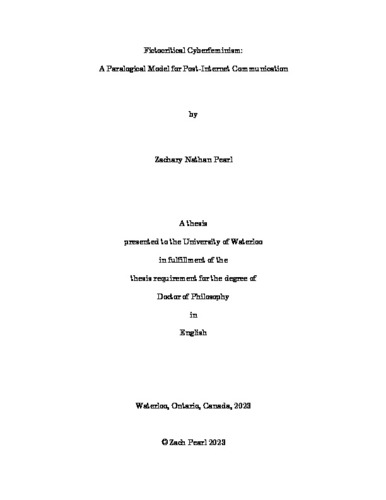| dc.description.abstract | This dissertation positions the understudied and experimental writing practice of fictocriticism as an analog for the convergent and indeterminate nature of “post-Internet” communication as well a cyberfeminist technology for interfering and in-tervening in metanarratives of technoscience and technocapitalism that structure contemporary media. Significant theoretical valences are established between twen-tieth century literary works of fictocriticism and the hybrid and ephemeral modes of writing endemic to emergent, twenty-first century forms of networked communica-tion such as social media. Through a critical theoretical understanding of paralogy, or that countercultural logic of deploying language outside legitimate discourses, in-volving various tactics of multivocity, mimesis and metagraphy, fictocriticism is ex-plored as a self-referencing linguistic machine which exists intentionally to occupy those liminal territories “somewhere in among/between criticism, autobiography and fiction” (Hunter qtd. in Kerr 1996). Additionally, as a writing practice that orig-inated in Canada and yet remains marginal to national and international literary scholarship, this dissertation elevates the origins and ongoing relevance of fictocriti-cism by mapping its shared aims and concerns onto proximal discourses of post-structuralism, cyberfeminism, network ecology, media art, the avant-garde, glitch feminism, and radical self-authorship in online environments. Theorized in such a matrix, I argue that fictocriticism represents a capacious framework for writing and reading media that embodies the self-reflexive politics of second-order cybernetic theory while disrupting the rhetoric of technoscientific and neoliberal economic forc-es with speech acts of calculated incoherence. Additionally, through the inclusion of my own fictocritical writing as works of research-creation that interpolate the more traditional chapters and subchapters, I theorize and demonstrate praxis of this dis-tinctively indeterminate form of criticism to empirically and meaningfully juxtapose different modes of knowing and speaking about entangled matters of language, bod-ies, and technologies. In its conclusion, this dissertation contends that the “creative paranoia” engendered by fictocritical cyberfeminism in both print and digital media environments offers a pathway towards a more paralogical media literacy that can transform the terms and expectations of our future media ecology. | en |

